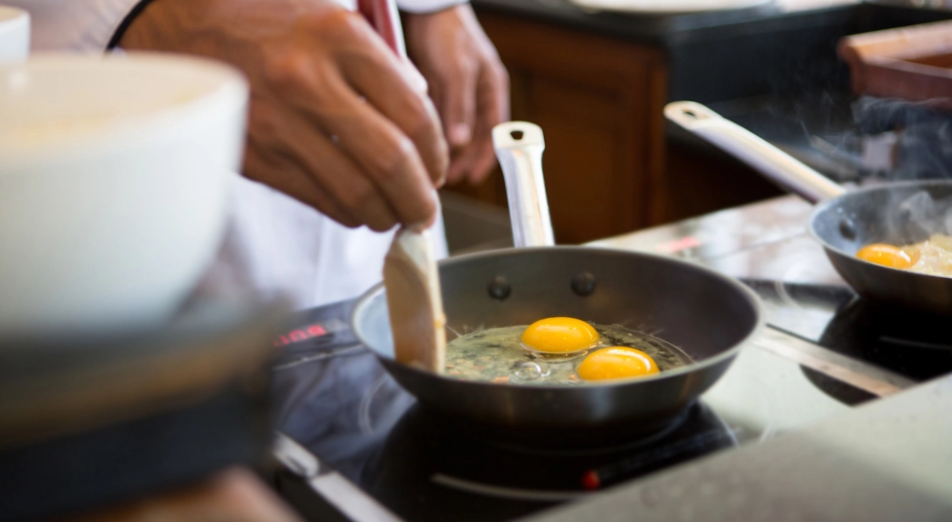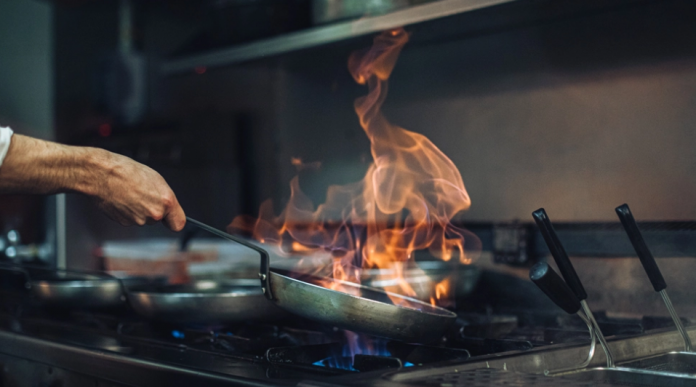While some chefs sing the praises of induction cooktops, a big switchover isn’t happening soon.
When chef Mike Lanham was building out his new tasting menu restaurant Anomaly SF, which opens in San Francisco’s Pacific Heights this week, one thing in particular was weighing on him—his gas stove.
“[I was concerned] not just [about] my health, but also the health of those that work with me,” he said.
Gas stoves, the cooktop of choice for restaurant kitchens and 40 percent of homes in the US, have recently been shown to emit harmful air pollutants that lead to respiratory problems, cardiovascular diseases, and even cancer. New reports from groups including the American Chemical Society and publications such as the International Journal of Environmental Research and Public Health blame the cooktop’s emissions—nitrogen dioxide, carbon monoxide, formaldehyde, and fine particulate matter—which are at unsafe levels outdoors, let alone indoors, according to standards set by the EPA and World Health Organization.
In response to the studies, federal lawmakers have asked the US Consumer Product Safety Commission to look into the issue. Later this year, the commission could set emission standards on the appliances, require them to be used with exhaust vents or warning labels, or ban the manufacture and import of gas stoves altogether. On the local level, communities such as Berkeley, California, have been concerned for years. The city voted in 2019 to ban natural gas hookups in new buildings, citing a desire to reduce greenhouse gas emissions.
Of course, after New York Governor Kathy Hochul backed a potential gas ban last week, the gears of the Republican backlash machine began turning, calling the suggestion “totalitarian” and more. We wanted to cut through all of that culture war noise and speak with chefs who have put both gas and electric cooktops to the test to see how they felt about cooking with either technology.

For restaurant kitchens, the alternative to gas stoves is induction cooktops, which run on electricity. Michelin three-star restaurants The French Laundry in Napa Valley and Alinea in Chicago have vowed to switch to energy-efficient electric. Chef Curtis Stone has used induction “exclusively” over the last few years at his LA restaurant Gwen, which also has a Michelin star.
“I love induction because of how precise it is as a cooking method,” Stone told Robb Report. “The cleanup is effortless and it keeps your kitchen cooler than a gas cooktop, while also being better for the environment.” Of course, there are open flames at Gwen, but that’s from the wood-fired grill you can see from the dining room.
Lanham, too, said he “badly” wanted to adopt induction stoves. A former competitive cyclist, he tries to nourish a healthy environment in his kitchen. But in the end, gas was the more “practical” option in his 34-seat space.
“[Induction stoves] look cool, they’re quiet, and they get hot incredibly fast,” he said. “Unfortunately, they also break easily and without warning, they’re hard to repair, they struggle with modulation in many, but not all, cases, and they tend to draw a great deal of power, so they blow fuses like it’s a design feature.”

Other chefs polled by Robb Report said the same thing: Induction is fragile. In the fast-paced environment of a restaurant kitchen, pots and pans aren’t handled delicately. Induction cooktops, for the time being, may be best suited for the pastry line, where precise recipes and a light touch are expected.
At Stone’s Michelin one-star restaurant Maude in Beverly Hills, he uses a combination of induction and gas. The same is true of chef James Syhabout of Michelin two-star Commis in Oakland, California, where electric is primarily employed to make desserts.
Without federal regulations changing, it may be hard for chefs to unhook their gas stoves and invest in new electric ones. Some, who have cooked on live fire their entire careers, feel that using induction is almost too easy, too sterile. Working on traditional gas feels like more of an art, “like playing the drums on a French top,” in the words of one Michelin-starred Chicago chef.
But Lanham, who named his restaurant Anomaly SF for a reason, is game for deviating from the norm—at some point in the future.
“I care nothing for tradition or what anyone else thinks is cool, but electric stoves have a long way to go,” he said. “However, if the tech catches up, I would love to give electric stoves another try.”
Published By: Robb Report




